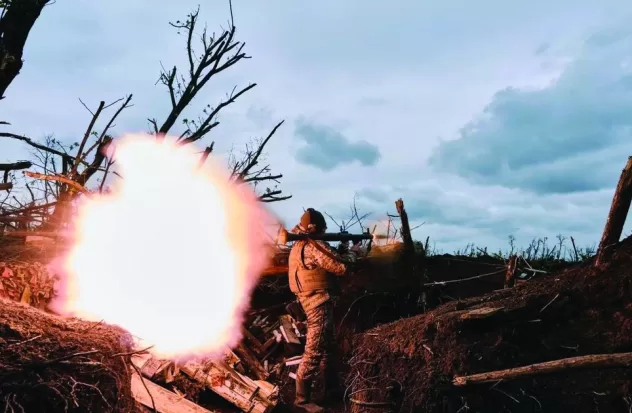MADRID.- Russia has taken Avdiivka (a city where intense fighting took place after the invasion two years ago) and President Biden faces a difficult decision: either close the border with Mexico or lose Ukraine.
The more than $60 billion aid package for Ukraine, which would be the minimum required to counter further Russian advances, is stalled in Congress with little prospect of passage in the immediate future unless the Biden administration is willing to implement the measures implemented by Donald Trump to stop the massive migratory flow. Reacting to Democratic moves to force a vote last week, House Speaker Mike Johnson put the legislative body on recess for two weeks.
If Ukraine does not receive the necessary help to replenish its depleted ammunition reserves, it would be unable to counter the growing Russian offensive. Vladimir Putin orders his army to advance beyond Avdiivka and complete his conquest of the entire region in three weeks, according to Ukrainian Intelligence services.
Putin and his strategy for victory
In a recorded meeting with his defense minister on February 20, Putin presented his strategy for building on his victory. “As for the situation in Avdiivka, this is a great success, but to develop it we must be well prepared, providing the necessary personnel, equipment and ammunition,” Putin stressed.
Ukraine’s shortage of ammunition, particularly for air defense, allowed the capture of Avdiivka by the Russians, according to reports from the Institute for the Study of War in Washington, “intense” air attacks by Russian Su-34 fighter-bombers in support of their infantry, were decisive in the final phases of the battle.
“The Russian ability to execute massive airstrikes over several days on the most active section of the front suggests that Ukrainian forces were not able to deny it air dominance around Avdiivka. Delays in assistance from the West would further reduce Ukrainian air defense capabilities, allowing Russian forces to repeat the air support that facilitated Russian advances at Avdiivka, along the entire front line in Ukraine,” according to the ISW.
Glider bombs with half-ton warheads dropped on an industrial plant that served as a fortress for Ukrainian troops may have motivated the decision of the newly appointed commander of the armed forces, General Oleksandr Syrsky, to order a withdrawal.
Syrsky personally led the elite Third Assault Brigade equipped with Abrams tanks and American Bradley fighting vehicles to reinforce Avdiivka, but when a chemical fire at the plant caused by airstrikes raised a toxic cloud over the area, he realized the unsustainability of the situation.
The relevant capture of Avdiivka by the Russians
Despite his reputed indifference to casualties, Syrsky withdrew the troops to “preserve their lives and health” according to the official statement. His two or three brigades, including units exhausted from having held out at Avdiivka for four months, faced seven Russian brigades that surrounded the city.
The capture of Avdiivka, at a cost to Russia of more than 20,000 casualties and thousands of tanks, tanks and artillery pieces, consolidates the central front of Donetsk. The Ukrainian presence in Avdiivka was an obstacle to Putin’s plans to dominate the Donbass, as it controls a railway line, threatening the Russian position in the nearby city of Donetsk and the southern flank of Bahkmut, captured by Russia last spring after of 8 eight months of siege and 25,000 casualties.
Having consolidated this key section of the front, Russian forces can launch their advance towards Kramatorsk, the nerve center and industrial heart of the Donbas that was bombed by Su-34 fighters the day after the capture of Avdiivka. With a population of 100,000, steel plants, iron mines, gas fields and engineering centers, control of Kramatorsk could be crucial in future negotiations for the partition of Ukraine that already seem almost inevitable.
Russia is also intensifying attacks in the Zaporizhia region to dislodge Ukrainian forces from Robotyne, in control of Ukraine in its failed counteroffensive last summer. There are breaking reports that the Russians are also expelling Ukrainian marines from positions taken last October on the east bank of the Dnipro River. Russian advances extend along the entire 1,000-kilometer front to the northern sector at Kupyansk, where Russia concentrates hundreds of tanks.
Moscow plans to intensify its offensive
Analysts anticipate that Putin plans to intensify the offensive after the elections when it will be easier for him to implement forced conscription to fill his ranks at a time when Ukraine is suffering from a shortage of troops.
Europeans are rushing to obtain the weapons necessary to defend Ukraine.
When Avdiivka fell into Russian control, President Zelensky went to Paris and Berlin to get help. Alarmed by the Ukrainian army’s growing ammunition shortage, the European Union’s high commissioner for foreign affairs, Josep Borrel, appealed to member countries to send as much as possible “immediately.”
Half a million 155mm artillery shells are on the way, according to European Commission President Ursula Von der Leyen who says she will create a defense post to coordinate shipments. But even so, it is only half the amount promised by Germany last year and there are serious doubts that Europe will soon reach a production level that matches Russia’s production of more than 100,000 rounds a month. Russia also receives large quantities of ammunition from Iran and North Korea.
At the time of going to press, the Czech Republic announced that it could collect 300,000 155 mm and 122 mm shells from third countries to send to Ukraine, if the EU gave it funding. In a noble gesture, Denmark announced that it would donate all of its artillery to Ukraine, consisting of 19 Howitzer guns.
The NASAMS medium-range anti-aircraft missiles resupplied by Norway, as well as IRIS T systems sent by Germany, do not have the power to intercept the Russian hypersonic missiles that only the North American Patriots possess, whose supply runs out next month, according to the Pentagon. This would give Putin the opportunity to launch a massive attack with his Kh-22s. Kh-59 and other missiles with speeds of 4,000 mph or more, capable of destroying Ukraine’s energy and industrial infrastructure, according to Dr. Machael Clark, former director of the Royal United Services Institute, a semi-official think tank of the British Ministry of Defense.
Biden’s responsibility
The Biden administration will blame “Trump-supporting” Republicans if Ukraine is defeated or forced to cede much of its territory to Russia. Hints of such a possible outcome were evident during the international security conference in Munich last week, when the Chinese foreign minister appeared to turn a deaf ear to calls from the Ukrainian foreign minister to mediate negotiations, saying that conditions had not “ripened.” “enough to start conversations.” Some analysts interpret it as the gift of time for Putin to achieve his territorial objectives.
Biden, for his part, will have to take responsibility for a tragic outcome in Ukraine.
His shameful withdrawal from Afghanistan emboldened Putin to challenge the might of the West. His failed “green policies” increased the dependence of European allies on Russian oil and gas, putting them at an economic disadvantage and making it difficult to apply sanctions. The provision of weapons that Ukraine would need to overcome Russia has been too slow, such as the F-16s that Zelensky has been asking for for two years and have still not arrived, because the pilots have not completed their training, which could last several more months, according to the marshal. retired British, Sean Bell.
As the historic president Harry Truman once said, “the buck stops here” (you must assume your responsibility and not try to pass it on to others), if Biden is not able to change policies that the vast majority of Americans oppose to crystallize a popular will and manage to stop Russia, he would be the failed leader.


